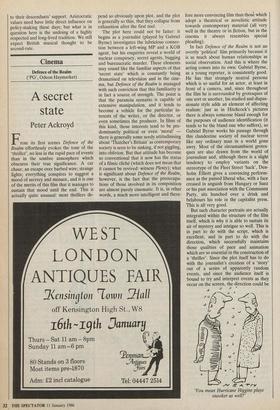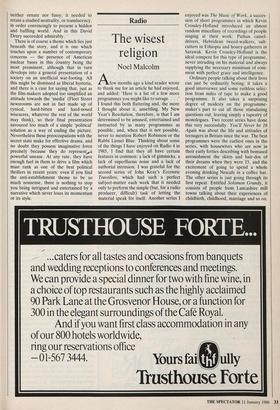Cinema
Defence of the Realm
(` PG', Odeon Haymarket) A secret
state
Peter Ackroyd
From its first scenes Defence of the Realm effortlessly evokes the tone of the `thriller', no less in the rapid pace of events than in the sombre atmosphere which obscures their true significance. A car chase; an escape over barbed wire; strange lights; everything conspires to suggest a mood of secrecy and menace, and it is one of the merits of this film that it manages to sustain that mood until the end. This is actually quite unusual: most thrillers de- pend so obviously upon plot, and the plot is generally so thin, that they collapse from exhaustion after the first reel.
The plot here could not be fatter: it begins as a journalist (played by Gabriel Byrne) investigates the lubricious connec- tion between a left-wing MP and a KGB agent, but his enquiries reveal a world of nuclear conspiracy, secret agents, bugging and bureaucratic murder. These elements may sound like the familiar aspects of that `secret state' which is constantly being dramatised on television and in the cine- ma, but Defence of the Realm is managed with such conviction that this familiarity is in fact a source of strength. The point is that the paranoia scenario is capable of extensive manipulation, and it tends to become a vehicle for the particular in- terests of the writer, or the director, or even sometimes the producer. In films of this kind, those interests tend to be pre- dominantly political or even 'moral' there is generally some seedy attitudinising about 'Thatcher's Britain' as contemporary society is seen to be sinking, if not giggling, into oblivion. But that attitude has become so conventional that it now has the status of a filmic cliché (which does not mean that it cannot be revived: witness Plenty); what is significant about Defence of the Realm, however, is the fact that the preoccupa- tions of those involved in its composition are almost purely cinematic. It is, in other words, a much more intelligent and there- fore more convincing film than those. which adopt a theatrical or novelistic attitude towards contemporary material (all very well in the theatre or in fiction, but in the cinema it always resembles special pleading).
In fact Defence of the Realm is not an overtly 'political' film primarily because it is as much about human relationships as social observation. And this is where the acting comes into its own: Gabriel Byrne, as a young reporter, is consistently good. He has that strangely neutral persona which is so useful for an actor, at least in front of a camera, and, since throughout the film he is surrounded by grotesques of one sort or another, his studied and dispas- sionate style adds an element of affecting realism: just as in Hitchcock's pictures there is always someone bland enough for the purposes of audience identification (it tends to be the bland one who suffers), so Gabriel Byrne works his passage through this clandestine society of nuclear terror like any ordinary man in a world gone awry. Most of the circumambient grotes- ques are also drawn from the world of journalism and, although there is a slight tendency to employ variants on the stereotype of the Fleet Street 'hack', Den- holm Elliott gives a convincing perform- ance as the pained liberal who, with a face creased in anguish from Hungary or Suez or his past association with the Communist Party, sits hunched over a drink and belabours his role in the capitalist press. This is all very good.
But such character portraits are actually integrated within the structure of the film itself, which is why it is able to sustain its air of mystery and intrigue so well. This is in part to do with the script, which is excellent, and in part to do with the direction, which successfully maintains those qualities of pace and animation which are so essential in the construction of a 'thriller'. Since the plot itself has to do with the journalist's creation of a 'story' out of a series of apparently random events, and since the audience itself is bound to try and interpret events as they occur on the screen, the direction could be `You mean Hurricane Higgins plays snooker as well?' neither ornate nor fussy; it needed to retain a studied neutrality, or translucency, in order convincingly to present a hidden and baffling world. And in this David Drury succeeded admirably.
There is of course a theme which lies just beneath the story, and it is one which touches upon a number of contemporary concerns — the presence of American nuclear bases in this country being the most prominent, although that in turn develops into a general presentation of a society on an unofficial war-footing. All this might be dismissed as liberal hysteria, and there is a case for saying that, just as the film-makers adopted too simplified an attitude towards the 'media' (Fleet Street newsrooms are not in fact made up of cynical, hard-bitten and hard-nosed wiseacres, whatever the rest of the world may think), so their final presentation savoured too much of a simple 'political' solution as a way of ending the picture. Nevertheless these preoccupations with the secret state make for effective drama, and no doubt they possess imaginative force precisely because they do represent,.a powerful unease. At any rate, they have enough fuel in them to drive a film which must rank as one of the best political thrillers in recent years: even if you find the anti-establishment theme to be so much nonsense, there is nothing to stop you being intrigued and entertained by a narrative which never loses its momentum or its style.



























































 Previous page
Previous page